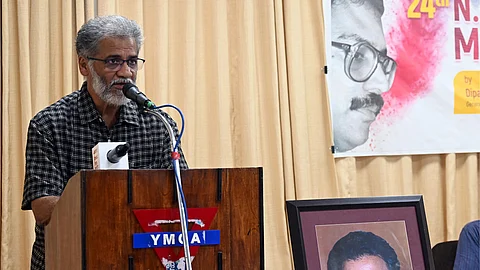

Breaking down the voter verification exercise in Bihar, summing up how that is yet another blow to democracy, Dipankar Bhattacharya posed the fundamental question on everyone’s mind at the Narendran Memorial lecture in Thiruvananthapuram on Tuesday, August 5. What will be left of democracy if the right to vote is taken away and elections slowly fade away?
The question came from Dipankar, the general secretary of Communist Party of India (Marxist-Leninist) [CPI(ML)], in a memorial event for N Narendran, the late journalist who was celebrated for speaking truth to power. The moderator journalist N Madhavan Kutty noted the irony in the CPI(ML), a party that had boycotted elections for years, being now at the forefront of fighting for the voting rights of people in Bihar.
Beginning his talk on why the party had decided to start contesting elections only in the 1980s, Dipankar said, “You could only boycott what you have,” and that many of the landless poor in Bihar had no voting rights. He recounted how 22 people in India who finally claimed their voting rights and exercised their franchise were gunned down for it. “That had brought us to the electoral arena,” the CPI(ML) leader said.
Years later, the Bharatiya Janata Party (BJP) in coalition with other parties in Bihar has begun the Special Intensive Revision (SIR), an entirely new and unprecedented exercise. It is, in Dipankar’s words, an ‘invasive reconstruction of the electoral roll’. Explaining the exercise, he said that the Election Commission allowed all the names which were in the 2003 voters list to be retained.
But the rest of the voters – a little under three crore – will need to prove their citizenship with documents. The problem was that the list of documents they recognised did not include voter’s id or Aadhaar—identification proofs that every Indian who wanted to vote was expected to carry. In place of it were ownership certificates and school leaving certificates, which a large number of poor or uneducated people did not possess.
“The NRC (National Register of Citizens) is one they accept, but it does not exist in Bihar. It was carried out only in Assam,” Dipankar reminded the audience of the controversial exercise that had resulted in the deportation of many people.
The documents were in addition to the enumeration form that everyone – including those in the 2003 list – had to submit. Based on the year of birth, younger citizens had to provide birth certificates of not just their own but one or both of their parents. For all this, the people were given a month, much like how demonetisation was sprung on us with an evening’s notice, Dipankar recalled. This new exercise, they call the ‘vote bandhi’, in line with the ‘note bandhi’ of demonetisation, he said.
While the Supreme Court is hearing petitions against the SIR, 66 lakh people have already been eliminated from the electoral roll. The Election Commission claims that “between January and now, 22 lakh people died and 36 lakh others had migrated,” Dipankar said.
He said that certain people who were alive were declared dead in the electoral roll, particularly Dalits, Muslims, women and the poor. While certain others of privileged backgrounds and supportive of the BJP featured in the roll, even if they were dead.
In line with the exercise was the Union government’s push for one nation, one election. “When [Union Home Minister] Amit Shah says we are here to rule for 50 years, that’s exactly what they mean. Election after election, they will produce a majority in some way; that is how fascism works. You’d think there would be no fascism in an electoral system. But in Italy and Germany, Mussolini and Hitler came to power through the elections and then rewrote the system. That’s what the BJP tries to do. Even in Bihar, where they are in coalition with Janata Dal (Union) [JD(U)], they come and say that in future only one party will be left in India,” Dipankar said.
The SIR should be a lesson for the rest of the states, especially where elections will soon take place, he said. It was not only socialism and secularism in the Constitution that offended the BJP, but the entire Constitution, he said. They want sovereignty gone too, and democracy, he added. Like in Nazi Germany, they created an ‘internal enemy’ with hitherto unknown hate against Muslims.
But Dipankar reminded the audience that all the anti-fascist parties had worked together to fight the British; only the BJP and their parent organisation, the Rashtriya Swayamsevak Sangh (RSS), had stayed away. The power of courage and unity was proved even recently when the farmers remained steadfast in their protest against the farm laws, and those laws had to be revoked.
Once again, it was imperative that all the anti-fascist forces stood together, and the INDIA bloc – created by rival political parties to fight the BJP – has a broad ideological spectrum. India should be the republic of freedom it was meant to be, not a republic of fear, Dipankar said.